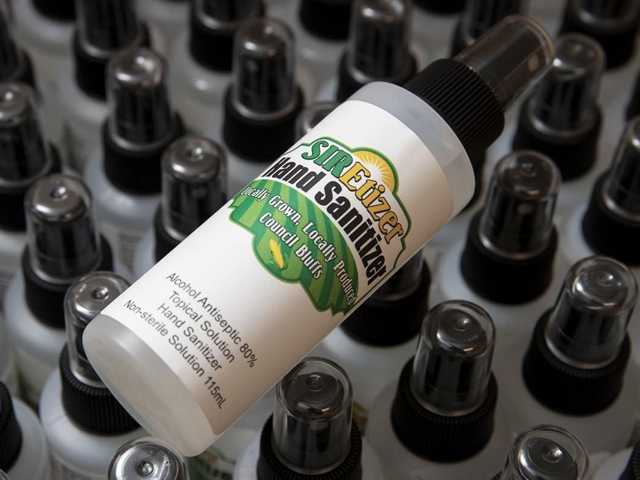RFA Seeks Sanitizer Clean Slate
FDA Guidance Still Complicating Ethanol Alcohol for Sanitizer During Pandemic
OMAHA (DTN) -- When it comes to attempting to help with a federal emergency, the old adage of "No good deed shall go unpunished" sometimes comes to mind.
Take the plight of ethanol producers.
An industry that produces billions of gallons of alcohol saw its fuel market crash with the country shutdown from the COVID-19 pandemic. Still, at least some ethanol producers stepped in to start selling alcohol for hand sanitizer or started making sanitizer themselves. Then, the Food and Drug Administration concluded possible questions about purity levels outweighed the national health-care crisis and need for greater sanitary conditions.
FDA first sent out a guidance to alcohol producers in late March, basically greenlighting more alcohol-based sanitizer from ethanol producers. Then, the agency changed the rules in an April 15 guidance. The new guidance stated that fuel-grade ethanol needed to meet specific grade requirements and be screened for impurities. But the FDA language was also ambiguous. Further, ethanol plants would have to submit information to FDA on impurity levels because it does not meet specific standards.
RFA leaders said FDA also said they were concerned about contaminants that are not actually in alcohol produced at ethanol plants.
"So FDA is making this far more confusing and difficult than it needs to be," Geoff Cooper, president and CEO of the Renewable Fuels Association, said on a call Friday with reporters.
Tim Winters, president and CEO of Western New York Energy, said his ethanol plant started working early during the pandemic to supply alcohol for hand sanitizer, partially to help area communities and also to keep the plant open while continuing to buy corn from area farmers. State agencies have helped with the regulatory issues, but Winters also criticized FDA for moving the goalposts with the changing guidance.
"I can't stress to folks enough that the lack of clarity from FDA has created such a ripple in the market for sanitizer," Winters said. "There are people who just don't know what they want to do or if they want to be in the market because they don't know what (FDA) is expecting of them, including ethanol plants."
P[L1] D[0x0] M[300x250] OOP[F] ADUNIT[] T[]
The New York ethanol plant is also shipping alcohol into Canada for sanitizer. Winters said the rules from Health Canada make it easier to send sanitizer there.
"Their rules have been very clear, very concise," Winters said.
Health Canada provided a simple waiver for alcohol from ethanol plants, recognizing there might be some slight impurities, but the pandemic is driving demand for significantly higher volumes of hand sanitizer to avoid a health crisis.
The FDA focus on impurity levels does not jibe with the need for sanitizer to deal with the needs to slow down a pandemic, he said. The market for sanitizer has grown dramatically with suppliers expecting even greater demand for sanitizers as the economy opens.
"Do we really think there will be less demand for sanitizers? I don't believe so," Winters said.
On Wednesday, RFA wrote directly to FDA Administrator Stephen Hahn, asking for clarity and certainty for using alcohol for hand sanitizer.
As part of an industry poll conducted by Morning Consult, 78% of the 2,000 or so people in the poll said they support ethanol producers making alcohol for hand sanitizer products. Just 8% said they don't support it, while 14% of respondents said they didn't know or didn't have an opinion.
Still, as FDA has complicated the potential sanitizer market, backers of the petroleum industry make it seem like ethanol producers are making a killing in the sanitizer market. A writer for the website oilprice.com earlier this week characterized that the "hand-sanitizer boom could save the ethanol industry." That's not quite the case, ethanol leaders said.
"This is not the panacea or the silver bullet to help the industry recover from the effects of losing half of our demand in the course of a couple of month in the fuel market," Cooper said. "The hand-sanitizer market does not require a drop in the bucket compared to the size and the scale of the fuel markets. It's just not accurate to say hand sanitizer is going to replace the demand we saw lost from COVID-19."
Ethanol companies were on pace in February to produce roughly 16.5 billion gallons of ethanol for 2020, but production has fallen roughly 50% since the pandemic began and fuel demand crashed. At the end of April, the industry was looking at closer to 8.2 billion gallons of production.
"So in just six or seven weeks, we saw production drop by more than 50% in the ethanol industry. It's just completely unprecedented."
The worst may be behind the industry as states begin to open up and fuel demand increases. Gasoline consumption last week was 46% higher than it was in mid-April during the peak of COVID-19 restrictions. Ethanol is bringing down some record stockpiles and demand is picking up, but is still lagging behind gasoline at this point.
"We are encouraged by the developments, but far from out of the woods," said Neil Koehler, chairman of RFA and co-founder and CEO of Pacific Ethanol.
The Morning Consult poll showed the public still has a favorable view of ethanol, with 59% of respondents supporting the industry, and the Renewable Fuels Standard, which had 55% of respondents stating it should stay in place. Just 14% of respondents said the RFS should be repealed. Another 31% of respondents did not have an opinion or did not know their view.
The industry also is thankful House leaders included a 45-cent-per-gallon credit for ethanol as part of the Health and Economic Recovery Omnibus Emergency Solutions (HEROES) Act, which was expected to pass the House sometime Friday. The HEROES Act will not pass the Senate and is not supported by President Donald Trump, but it sets a marker that the House included support for the ethanol industry.
USDA on Friday announced it would also start accepting applications for a $100 million grant program to expand ethanol and biodiesel infrastructure (https://www.rd.usda.gov/…). The grants will go to helping boost blend volumes largely through cost-share as high as 50% for fuel pumps or other related infrastructure. The grants can go as high as $5 million. RFA leaders said the grant program would likely help expand the volume of year-round E15 blender pumps across the country.
Chris Clayton can be reached at Chris.Clayton@dtn.com
Follow him on Twitter @ChrisClaytonDTN
(c) Copyright 2020 DTN, LLC. All rights reserved.






